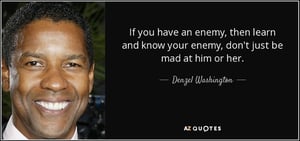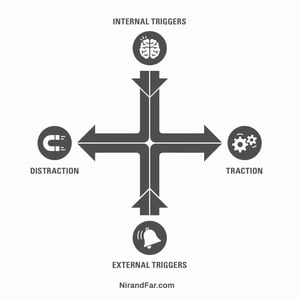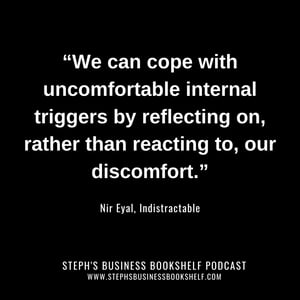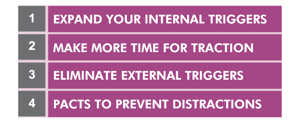 “If you know the enemy and know yourself, you need not fear the result of a hundred battles. If you know yourself but not the enemy, for every victory gained you will also suffer a defeat. If you know neither the enemy nor yourself, you will succumb in every battle.” ~Sun Tzu
“If you know the enemy and know yourself, you need not fear the result of a hundred battles. If you know yourself but not the enemy, for every victory gained you will also suffer a defeat. If you know neither the enemy nor yourself, you will succumb in every battle.” ~Sun Tzu
The enemy to being more productive is distraction. To be more productive we must understand the root cause of distraction and know ourselves.
This is Nir Eyal’s intention in Indistractable: How to Control Your Attention and Choose Your Life.
If you read one book during Coronavirus, read this.
TRACTION AND DISTRACTION
 Eyal shares this chart to represent the value of everything you do throughout your day, on the right actions are positive, to the left, negative.
Eyal shares this chart to represent the value of everything you do throughout your day, on the right actions are positive, to the left, negative.
To the right side of the continuum is traction. Think of traction as the actions that draw us toward what we want in life.
On the left side is distraction, the opposite of traction.
Distractions impede us from making progress toward the life we envision. Whether they tend toward traction or distraction, all behaviors, are prompted by triggers, internal or external.
Internal triggers cue us from within.
External triggers are from our environment. The pings, dings, and rings prompting us to check our emails, open a news alert, or answer a phone call. External triggers also take the form of other people, like your daughter asking you for a juice. They can also be objects. One of my friends complained when he worked from home the television being on interrupted him.
Being indistractable means striving to do what you say you will do.
Indistractable people are as honest with themselves as they are with others. Caring about your work, your family, and your physical and mental well-being, you need to learn how to become indistractable.
What Really Motivates Us?
Motivation has much less to do with pleasure than was once thought.
Eyal notes even when we think we’re seeking pleasure; we’re driven by the desire to free ourselves from the pain of wanting.
“By pleasure, we mean the absence of pain in the body and of trouble in the soul.” ~ Epicurus,
The drive to relieve discomfort is the root cause of all our behavior, while everything else is a proximate cause.
Unless we deal with the root causes of our distraction, we’ll continue to find ways to distract ourselves.
Distraction, it turns out, isn’t about the distraction itself; rather, it’s about how we respond to it.
.jpg?width=225&name=images%20(1).jpg) Most people don’t want to acknowledge the uncomfortable truth; distraction is always an unhealthy escape from reality.
Most people don’t want to acknowledge the uncomfortable truth; distraction is always an unhealthy escape from reality.
Only by understanding our pain can we begin to control it and find better ways to deal with negative urges.
Distraction is about more than your devices. Separate proximate causes from the root cause.
Distraction is a way our brains deal with pain. It makes sense the only way to handle distraction is by learning to handle discomfort.
If distraction costs us time, then time management is pain management.
Why are we perpetually restless and unsatisfied?
Humans are hardwired for this sort of dissatisfaction.
The “happily ever after” you see in the movies? It’s a myth. Happiness is designed to never last for long. Evolution gave us a brain in a near-constant state of discontentment.
The Review of General Psychology notes, “If satisfaction and pleasure were permanent, there might be little incentive to continue seeking further benefits or advances.”
The evolutionary traits helping our kin to survive by driving them to constantly do more conspire against us today.
Four psychological factors make satisfaction temporary.
- The first factor: boredom.
- The second psychological factor driving us to distraction is negativity bias, “a phenomenon in which negative events are more salient and demand attention more powerfully than neutral or positive events. It appears to be a basic, pervasive fact of psychology that bad is stronger than good.” ~Bad Is Stronger Than Good - Carlson School of Management
- The third factor is rumination, our tendency to keep thinking about bad experiences.
- The fourth factor may be the cruelest of all.
 Hedonic adaptation, the tendency to quickly return to a baseline level of satisfaction, no matter what happens to us in life, is Mother Nature’s bait and switch.
Hedonic adaptation, the tendency to quickly return to a baseline level of satisfaction, no matter what happens to us in life, is Mother Nature’s bait and switch.
By understanding our pain, we begin to control it and find better ways to deal with negative urges. The antidote to impulsiveness is forethought. Planning ensures you will follow through.
A One Thing Focus, Quarter and Annual Planning are all tools business use to gain traction.
Growth demands Strategic Discipline.
To build an enduring great organization, requires disciplined people, disciplined thought, disciplined action, to produce superior results, and make a distinctive impact in the world.
-2.jpg?width=300&name=3%20Disciplines%20of%20Execution%20(Strategic%20Discipline)-2.jpg) Discipline sustains momentum, over a long period of time, laying the foundations for lasting endurance.
Discipline sustains momentum, over a long period of time, laying the foundations for lasting endurance.
A winning habit starts with 3 Strategic Disciplines: Priority, Metrics and Meeting Rhythms. Forecasting, accountability, individual, and team performance improve dramatically.
Meeting Rhythms achieve a disciplined focus on performance metrics to drive growth.
Let Positioning Systems help your business achieve these outcomes on the Four most Important Decisions your business faces:
|
DECISION |
RESULT/OUTCOME |
|
PEOPLE |
|
|
STRATEGY |
|
|
EXECUTION |
|
|
CASH |
|
Positioning Systems helps mid-sized ($5M - $250M) business Scale-UP. We align your business to focus on Your One Thing! Contact dwick@positioningsystems.com to Scale Up your business! Take our Four Decisions Needs Assessment to discover how your business measures against other Scaled Up companies. We’ll contact you.
NEXT BLOG – Key to Controlling Attention – Be Indistractable
 Indistractable: How to Control Your Attention and Choose Your Life provides 4 keys to controlling your attention to achieve your goals. We’ll explore 4 steps: #1 — Expand your internal triggers, #2 — Make more time for traction, #3 — Eliminate external triggers, and #4 — Pacts to prevent distractions, in our next blogs to help make you more productive.
Indistractable: How to Control Your Attention and Choose Your Life provides 4 keys to controlling your attention to achieve your goals. We’ll explore 4 steps: #1 — Expand your internal triggers, #2 — Make more time for traction, #3 — Eliminate external triggers, and #4 — Pacts to prevent distractions, in our next blogs to help make you more productive.






.jpeg?width=150&height=135&name=Hand%20with%20marker%20writing%20the%20question%20Whats%20Next_%20(1).jpeg)

